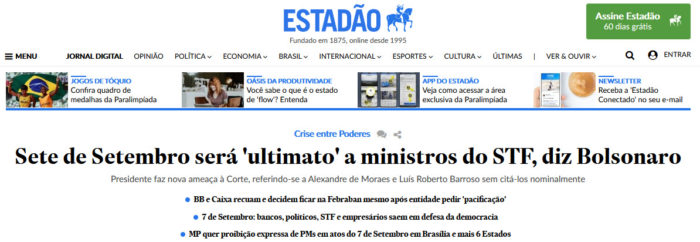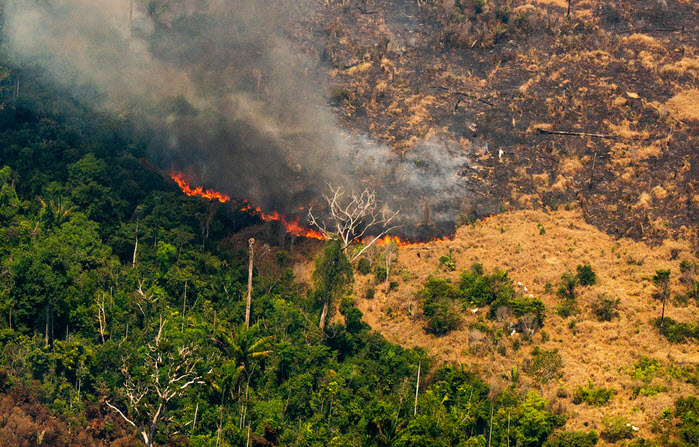The country is in flames – literally and metaphorically
Fires rage up and down Brazil, from the Amazon to São Paulo. Flames have engulfed huge areas of rainforest, the Pantanal, the Cerrado, indigenous reserves, national parks and city hills, sending thick clouds of smoke into the air, leaving thousands coughing and choking, and more vulnerable to Covid-19.
The fires are compounded by a record-breaking drought which has emptied reservoirs, drained rivers, and left the countryside tinder dry. But many are deliberately started by ranchers clearing land for cattle and landgrabbers clearing forest to sell, or in the cities by the reckless and illegal release of giant hot air balloons which land in parks or on hillsides.
The metaphorical fires are being stoked by Brazil’s chief incendiary, president Jair Bolsonaro, fanning the flames of polarization, sedition and violence in order to produce the chaos that will enable him to declare radical measures, a state of siege, or some sort of coup. He tells his supporters:
‘Go and buy guns, only idiots buy beans’.
‘If you want peace, you have to prepare for war’.
‘If the Supreme Court refuses to recognise the marco temporal (the artificial time limit on indigenous claims to their own land) then agribusiness will be finished in Brazil, I don’t know what we’ll do, we will have to import food.’
‘Electronic ballot boxes allow fraud, unless we go back to paper ballots, there will be no elections’.
When in doubt, sow chaos
What has become clear is that every time the real news gets too close for comfort – his various sons accused of corruption or spreading fake news, the economy nosediving as inflation accelerates, food prices soaring, unemployment growing, and now the real threat of water and energy shortages, Bolsonaro launches an outrageous attack on the Supreme Court, the Election Tribunal, or the Senate Committee of Inquiry into the pandemic, to distract attention.
The media then spends two or three days discussing the red herring instead of looking at the real news. It’s a well worn tactic but it still works. But it also creates what investors hate – political instability – so they stay away, contributing to the economic malaise.
This situation is causing increasing concern among sectors who have so far backed Bolsonaro, even when he attacked democratic institutions and dismantled environmental, cultural and educational advances. A flurry of manifestos and notes has appeared, appealing for calm and tranquillity. Even the conservative representatives of industry and the banks, FIESP and Febraban, prepared a timid note, signed by at least 200 bankers and businessmen, ´proposing harmony between the powers’ and taking care not to assume an anti-government tone. But then, apparently leant on by congress leader Carlos Lira, a loyal Bolsonarista, they delayed its publication. This is the situation we are in – powerful institutions afraid to say boo to the goose, or should it be the goose step?
Brazil’s 6 January?
Attention is now focussed on 7 September, Brazil’s Independence Day. Because of the pandemic the traditional military parade has been suspended by the Armed Forces, but instead Bolsonaro is encouraging his supporters – who include radical ruralistas, members of evangelical churches, lorry drivers, military policemen, and digital influencers to take to the streets, turning what has always been a national celebration of independence into a political demonstration in support of himself. Ostensibly they will be defending freedom but many of his most fanatical followers are openly preaching violence – ‘come armed, invade the STF and Congress’.
Wealthy pro-Bolsonaro businessmen and soy farmers are offering free transport to swell the numbers. They hope to bring two million people to Brasilia. It is reported that at least 50 buses will bring hundreds of off duty policemen from the interior of the state to the demonstration in São Paulo. In Rio, the Military Club is asking ex-army officers to join the protests. Sales of military uniforms are said to have shot up – raising the prospect of a sort of Dad’s Army of Bolsonaro supporters, although they will be carrying more than rusty rifles.
USP professor Pablo Ortellado says that officially the demos are in support of Bolsonaro, but the real message will be support for his attitude of rupture, ‘…in the subterranean propaganda, especially on WhatsApp, this is said more or less openly.’
Some are asking if 7 September will be Brazil’s 6 January, the day of the US Capitol invasion?
The fear that Bolsonaro is planning to override the democratic institutions in the name of ‘freedom’ prompted Supreme Court judge Ricardo Lewandoski to warn of the consequences of violating the Constitution, remembering Julius Caesar’s fate after he crossed the Rubicorn with his army.
Feeling out the military
It also prompted a number of ex-presidents to sound out military contacts about the mood among the men in uniform. So far at least reports from the front seem to indicate that the generals, admirals and brigadiers have no intention of supporting any rupture, any anti-constitutional acts. But the mere fact that politicians find it necessary to consult the military, recognising a moderating power they are not supposed to have, is worrying.
I can’t help remembering the days of the dictatorship when everyone anxiously scanned the papers, reading between the lines of speeches and editorials in an attempt to find out what the military were really thinking.
Meanwhile the bread and butter problems that affect Brazilians steadily snowball. The worst drought for 90 years and Bolsonaro’s stubborn refusal, with an eye on his popularity ratings, to admit there is any problem is bringing a real possibility of an energy crisis and power blackouts in October or November. The most the government has done is to suggest people think twice before ironing, or turn off a light.
Instead it is relying on price hikes – over 20% in the last 12 months – to reduce consumption, penalizing the poorest. Millions who had been lifted out of extreme poverty and got electricity for the first time during Lula’s governments are returning to a situation of hunger, sitting in the dark.

‘Brazil faces a long 16 months before the mandate of the worst president who has ever governed Brazil comes to an end. Nothing indicates that the grave problems which affect the country will be dealt with’, ran an editorial in the conservative paper which supported Bolsonaro in the 2018 elections, the Estado de S.Paulo. Two thirds of the way through his government, the result is an unparalleled failure, and the situation seems irreversible, says the paper.
Added to the economic problems, Bolsonaro also has the senators of the pandemic investigation committee snapping at his heels as they uncover scandal after scandal involving overpriced vaccines, shady middlemen and a network of bribes at the Health Ministry.
Lula’s star rising
With these multiple crises, Bolsonaro’s hopes of winning the 2022 election seem to be fading fast. To make matters worse, his arch rival Lula has been cleared in the courts of most of the spurious charges brought against him by the Lavajato investigation prosecutors, aided by judge Sergio Moro, now declared to have acted with partiality by the Supreme Court. Lula’s popularity soars, the polls indicate he will easily beat Bolsonaro. To combat the accusation that this will be an election of extremes, Lula is building a network of cross party alliances, seeking to persuade those who still hanker after a ‘third way’, a middle of the road candidate, that he is that person.
While Lula travels the country, talking and listening, Bolsonaro has recruited Steve Bannon, Trump’s former strategist and counsellor, to bring his Machiavellian arts to his aid. The Bolsonaro/Bannon team are relying on digital militias, fake news and threats to win the elections, as they will have only negative achievements to show.
The very real possibility of an ignominious defeat in 2022 makes the threat of a rupture, some sort of a coup, more probable. What happens on 7 September could be a crucial test of Bolsonaro’s support, empowering his anti-democratic attitudes if the turnout of his supporters is huge, or strengthening the opposition, if the counter-demonstrations are larger.
The threat of the ‘Marco Temporal‘
This uncertainty about the future which hangs over Brazil also hangs over the indigenous population, as the Supreme Court deliberates on an attempt to question the claim of any indigenous group to land it did not physically occupy on 5 October 1988, the date when the present constitution was adopted.
The fact that many had previously been expelled or forced out of their ancestral lands by roads, dams, cattle ranchers, landgrabbers, is ignored. Instead the powerful interests that are promoting the so called marco temporal, or time limit, want to occupy indigenous lands with soy and mining projects. An expensive media campaign with full page ads in newspapers is trying to convince Brazilians that unless the marco temporal is approved, Indians will want to claim Copacabana and other prize areas, and demand an area as big as the entire south of Brazil. ‘STF judgement could affect properties in all of Brazil’ was one headline.
Indigenous leader Ailton Krenak points out that all of Brazil was once indigenous land, it is the non-indigenous who invaded. As it is, cattle ranches already occupy 20 per cent of Brazil, considerably more than the 13 per cent occupied by indigenous areas, many of which are still waiting to complete the lengthy process of demarcation.
Also, at a time when fires are raging in the Amazon, and the tipping point is imminent, indigenous areas, because they are far better preserved and less deforested, are absolutely vital in maintaining the function of the rainforest as carbon sink and rainfall provider. They provide the only green belt, as loggers and grileiros ruthlessly burn and clear the rainforest, invading conservation areas, and garimpeiros pollute rivers with mercury in their search for gold. If the marco temporal becomes law, not only do the original peoples of Brazil face extermination, but so does the Amazon. The future of Brazil – environmental, diverse democracy or tinpot dictatorship – could be at stake in the coming days.

